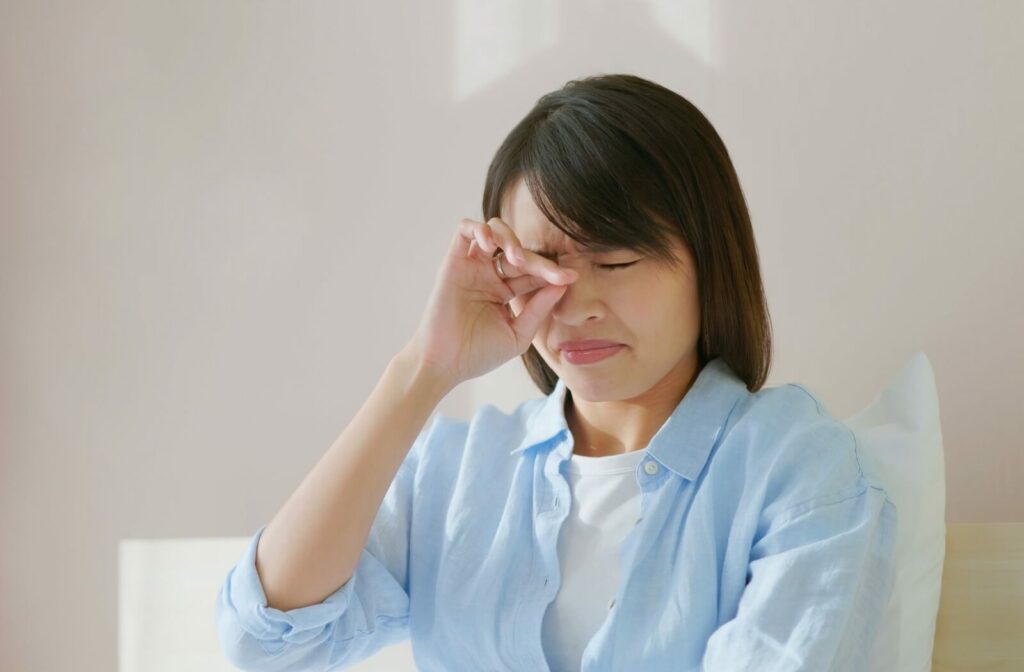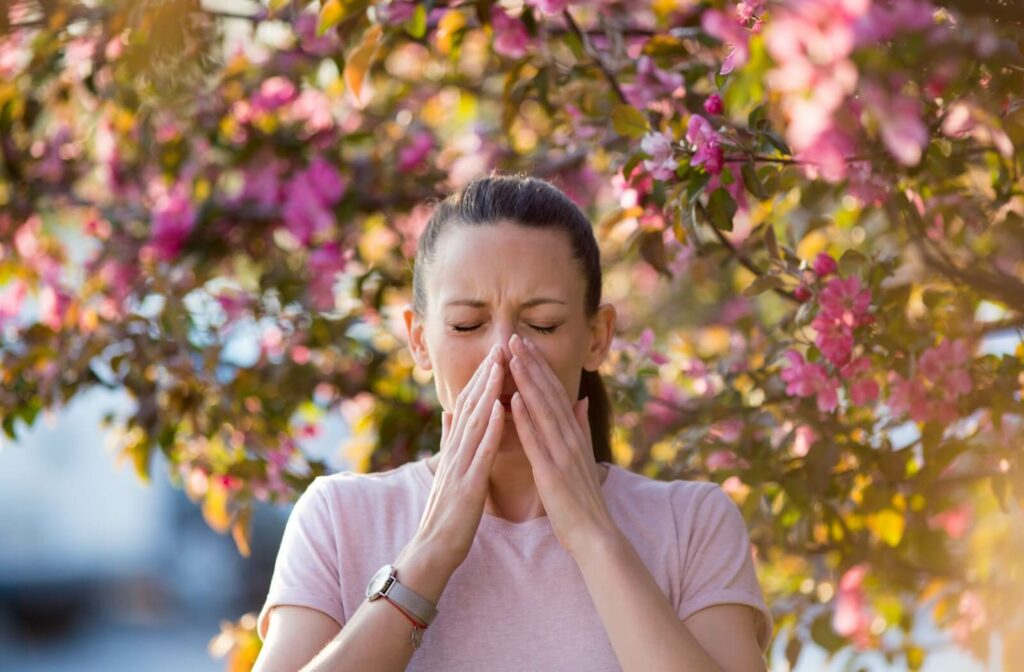Allergies can turn a perfectly sunny day into a blur of sniffles, sneezes, and that all-too-familiar sensation of dry, irritated eyes. Yes, allergies can absolutely cause dry eyes, and it’s more common than you might think.
Of course, allergies aren’t the only cause of dry eye, but understanding the source can help you find relief. This is why getting an eye exam is so important. Whether it’s pollen in the air or pet dander at home, this connection between your environment and your eyes can throw off your entire routine—affecting how you see the world.
What Is Dry Eye?
Dry eye is a common condition that affects people of all ages. It occurs when your eyes produce fewer tears or tears of poor quality. Your tears may seem simple, but they’re made up of 3 layers that help your eyes stay hydrated and protected. These layers are:
- The mucus layer: Keeps tears adhered to the surface of your eyes.
- The watery layer: Moisturizes and shields your eyes.
- The oily layer: Protects tears from rapid evaporation.
When these layers are healthy, you can enjoy nice, comfortable vision. But, if anything disrupts the glands responsible for these layers, your tears might not work as they should, leading to many frustrating symptoms, including:
- Red eyes
- Blurry vision
- Light sensitivity
- A burning or scratchy sensation
- Mucus in or around the eyes
- Feeling like something is in your eye
- Trouble wearing contact lenses comfortably
- Excessively watery eyes without relief
Environmental factors like wind, heat, or screen time, along with conditions such as age, gender, diet, and medications, can all raise your risk of dry eye disease.
Mild dry eye can be annoying, but don’t brush it off! If left untreated, it can lead to infections or even corneal scarring.
How Allergies Affect Your Eyes
Allergens are substances that are normally harmless. However, they can trigger an overreaction in some people’s immune systems. These allergic reactions can affect every part of the body, including the eyes. Eye allergies, or allergic conjunctivitis, occur when allergens trigger a response in your eyes.
When allergens come into contact with your eyes, they cause your cells to release histamine. While histamine serves important roles in your body, it also kicks your immune system into overdrive during an allergic reaction. This overreaction can lead to inflammation, making it difficult for the glands in your eyelids to produce healthy tears.
3 common types of allergens may result in eye allergies:
- Outdoor allergens like pollen.
- Indoor allergens such as dust mites, pet dander, or mold.
- Irritants like cigarette smoke, perfumes, or car exhaust.
Scratching or rubbing your eyes during a reaction is tempting—but it can worsen the situation. It can further irritate dry eye symptoms or damage your cornea, the transparent dome at the front of your eye.
Beyond dry eyes, symptoms of eye allergies can include:
- Itchy eyes
- Swollen eyelids
- Burning or irritation
- Redness
- Light sensitivity
- Watery eyes

Treating Eye Allergies
Eye allergies can be a real pain, but the good news is that usually once the allergic reaction subsides, so does the dryness. Until that happens, focus on treating the symptoms and keeping your eyes as comfortable as you can. Here are some tips that can help manage allergic dry eyes:
- Use artificial tears to maintain hydration.
- Apply a warm compress to reduce eyelid inflammation.
- Remind yourself to blink regularly.
- Consider upping your intake of eye-healthy nutrients.
- Use a humidifier to add moisture to the air and combat dryness.
Start with Preventing Allergic Reactions
Addressing allergy symptoms offers a lot of relief—but there is a better way. Once you know what your triggers are, you can try to avoid them and prevent allergic reactions in the first place. Be proactive; it can save you a lot of discomfort.
Consider your specific allergens, then take these steps to avoid them:
- Stay indoors during high pollen times, such as mid-morning or early evening.
- Avoid window fans that circulate pollen and mold.
- Shut windows during peak pollen seasons.
- Wash your hands after handling pets or plants.
- Avoid rubbing your eyes, even if they’re itchy.
- Wear wraparound sunglasses to shield your eyes outdoors.
- Wash bedding frequently to minimize dust mites and allergens.
Can Antihistamines Make Dry Eyes Worse?
Antihistamines are widely used to treat allergy symptoms like sneezing, runny nose, and itchiness. However, they can also reduce your tear production, making dry eyes worse for some people.
If your tears are generally healthy, you may not notice much of a difference when taking antihistamines. But if you have preexisting dry eyes, antihistamines might worsen your irritation. If you know this is going to happen, at least you can prepare yourself. Try using artificial tears to counteract the antihistamines or talk to your doctor about alternative allergy medications.
Dry Eyes? Don’t Wait for Relief
Managing allergies and their effects on your eyes doesn’t have to feel overwhelming. A proactive approach can make all the difference, helping you see comfortably no matter the season.
If you’re dealing with persistent dry eyes or not sure what’s causing the irritation, it may be time to book a consultation with Bethel Vision. We’re passionate about personalized eye care and helping you address dry eye symptoms with innovative treatments based on your specific needs. If allergies aren’t causing your dry eyes, we can diagnose the problem and develop a treatment plan using IPL, TearCare, meibomian gland expression, and more. Together, we’ll work toward keeping your eyes clear, healthy, and hydrated.Book your appointment today—refreshed vision is closer than you think!



